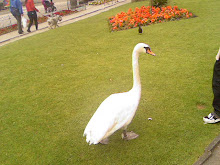 Now that we are on the subject of fairy tales, did anyone ever find any of them weird as a child? I certainly never did. They seemed like perfectly normal children’s stories to me. Full of fairies, giants, princesses, castles, dragons and witches etc. My seven year old, however, sees a lot more in them than just these things.
Now that we are on the subject of fairy tales, did anyone ever find any of them weird as a child? I certainly never did. They seemed like perfectly normal children’s stories to me. Full of fairies, giants, princesses, castles, dragons and witches etc. My seven year old, however, sees a lot more in them than just these things.A few days ago I was reading Jack and the Bean Stalk to her at bedtime. Every thing was going well till I reached the part where Jack sprints off with the giant’s gold, hen and harp. At that point my daughter looked up at me and asked very solemnly,
“Isn’t Jack stealing from the giant”?
“I guess he is”. I said
“But stealing is bad, than how can jack be a good person if he commits a sin"?
My seven year old realized the injustice prevalent in the story, something I was not able to do when I was a child. Maybe I was the product of an age when things were accepted as they were without much questioning. Then again, maybe I was just plain dumb
It never occurred to me when I was a kid as to how a common thief can be the good guy in the story if he continues to go back to steal someone else’s stuff while the giant is labeled as the antagonist, when all that he is trying to do is get his things back and teach jack a lessons for pinching them in the first place. (There is another less popular version which states that every thing Jack took had belonged to his father at one time. The giant was the thief who stole from his Jack’s father so Jack was only bringing back what was rightfully his inheritance. But that is just poppycock; it does not even make sense. For instance, where would Jack’s father, a mere mortal, get his hands on a magic harp and golden egg laying hen to begin with).
This moral dilemma occurred with disturbing frequency in several of my childhood stories ranging from Jack and the Beanstalk to Puss in Boats.
What I never realized back then was that these children’s’ stories actually depicted European mentality at that time, which more or less stated that you have a right to claim as yours what ever takes your fancy and if the owners object, it is perfectly justified to kill them, subjugate them or get rid of them any other way you see fit. History is full of living examples of this. Colonies were set up all over the world based on pretty much this very principle.

Perhaps that is why I appreciate the concept of motion pictures like Shrek. So what if you are an ogre, ugly and even bad tempered. No one has the right to kill you or throw you out of your place as long as you are minding your own business and harming no one. I am glad that this is the message which is now being conveyed to children. Perhaps that is the reason they have a better understanding of the realities of life than we, their parents did as children. They are sharper, cleverer and more perceptive.
I got a hefty doze of this keen awareness of theirs when I made up a story of a boy who played computer and video games all day long; a concept that was instantly rejected by my young daughter.
“There is no way he can play all day long”. She scoffed. “He has to stop during load shedding hours”.
I did not know weather to be delighted because my child was clever enough to take note of this technical flaw in my story or be devastated because to a seven year old, load shedding had become such an integral part of every day routine that life with out it , even in make belief stories could not be accepted.
Bottom line is, you can’t fool these kids. “That is how things are” and “you just have to accept it as such” are no longer appropriate answers. Children nowadays want answers that make sense, which can satisfy their ravenous curiosity. And I am ashamed to admit that I do not have satisfactory answers to more that half the questions my kids throw my way.








No comments:
Post a Comment